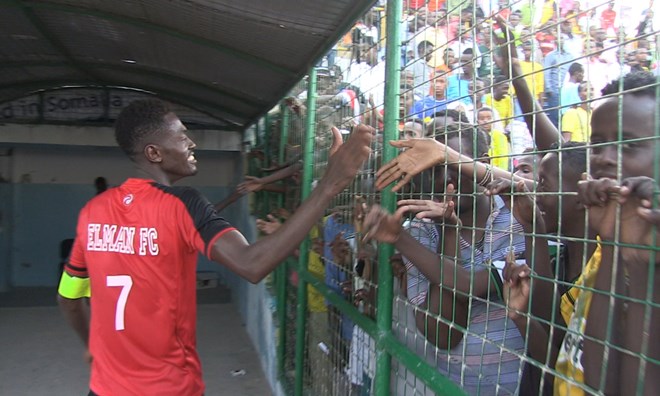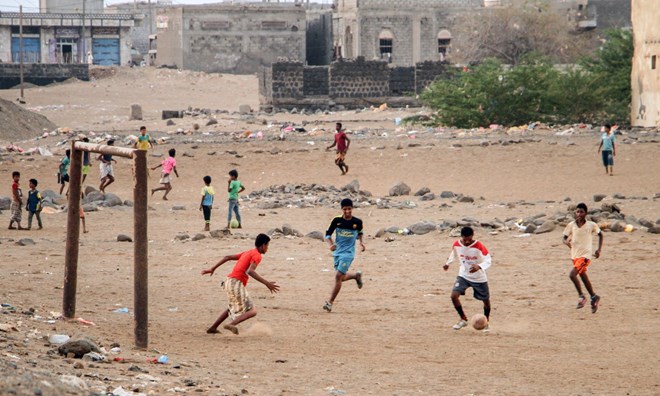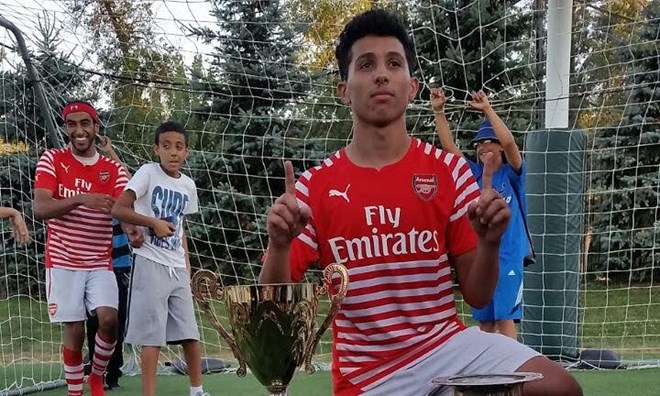We asked six players who came to the US how Trump’s attempted ban, which would bar travel for citizens of some Muslim countries, has affected their lives

Tuesday April 25, 2017
By Bryan Kay
Sa’ad Hussein during his playing days in Somalia. Photograph: PR
Sport lies down the list of concerns after President Trump’s attempted travel ban against six Muslim-majority countries, but soccer has not emerged untouched. An MLS club is reported to have missed out on a Muslim player in part because of the ban, while Columbus Crew forward Justin Meram pulled out of the Iraq national team squad for reasons related to the ban.
None of the six countries under the proposed ban are renowned soccer powers, but many immigrants from Iran, Syria, Somalia, Sudan, Libya and Yemen have used the sport to help integrate themselves into their new home. We spoke to players from each of the six countries about how the current climate has affected their lives.
Sa’ad Hussein, 24, Somalia
Hussein is a soccer hero in Somalia, an international midfielder of some standing in his home country. But the precariousness of life in Somalia prompted him to flee his homeland for eventual asylum in the US. He has just passed the one-year anniversary of his arrival in the US, and maintains hopes of US citizenship and a return to pro soccer from his base in St Louis.
“When I came to the US, I was excited – very happy to be in this country: to be free and away from Somalia’s troubles. I am very appreciative. I am not playing right now but I train and hope to play. I was 23 when I arrived, an established player in Somalia, but the level is higher here so I’m still working out and hopeful of being recruited soon.
“When I was in Kenya, where I first fled and awaited asylum, I thought of the US as a country that accepted everyone, welcomed everyone, regardless of race, religion and beliefs. And I still see the country this way even though there has been a minor setback recently. I still believe the US is the country for all. The first thing that came to my mind [after the travel ban was discussed] was my family who want one day to join me here. Will they be safe, will we be separated? That’s what I’m always worried about. All of the other people, too, who are always running away from the extremists in Somalia.
“Later, I decided to take part in a documentary about the situation in Somalia and talk about my story. That’s why I left for Kenya. Now that the movie [Men in the Arena] is coming out, I am worried about my family’s safety. That’s the whole reason I am here. Because if I was in Somalia and Al-Shabaab saw that documentary, they would kill me and my family. In the meantime, I’m still worried about my family.”
Ali Eldrasi, 40, Libya
Opportunity brought Eldrasi to the United States after a long playing career in the Libyan Premier League. He left his homeland shortly before the fall of the Gaddafi regime, later gained green-card status in the US and currently works to get his wife and two sons out of his home city of Benghazi. He coaches the next generation of youth soccer in the Austin area.
“I came to the United States in 2011 before the war broke out. I came like anyone. I have a dream. I want to study English. I want to open an academy because I love soccer. When my playing career was over, I decided to come here, finish my education, and pursue my passion. It has not been easy. I got a work permit after four years, then a green card after five. I’ve struggled. I’m still studying, I work as a distributor, and I still play amateur football. I also coach, mostly American and Latino kids.
“I was a professional for 16 years in Libya. When I was 18 I started in an academy in Benghazi, the professional club Al-Tahaddi. I also played for other clubs in the Libyan league, including Al Ahli in Tripoli and Al-Nasr, also in Benghazi. I played against Gaddafi’s son, Al-Saadi, many times when he played for Al-Ahli. I once had a chance to go to Turkey and Egypt but I couldn’t because [the Libyan FA] didn’t want me to go. That happened a lot – not just to me but to other players as well. It was really tough but now it’s more tough. It’s unsafe right now in my country. Go look at Benghazi now.
“Isis caught my brother. We don’t know about his body, we don’t know if he is alive. He always talked about Isis, that they are not good people, that they are killing people, they are not Islam. I have two sons and my wife over there. Right now they are in Benghazi. They always cry about wanting to come here but it’s not in my hands. They are waiting for a visa right now. Everything is tough. My kids say, ‘Dad, what’s going on?’”

Yemeni children play soccer in the port town of Mokha. Ali Shawish says of his childhood in Yemen: ‘We’d play soccer from morning till the sun went down.’ Photograph: Saleh Al-Obeidi/AFP/Getty Images
Nai Mayen, 22, Sudan
Mayen was five when he arrived in the US as a refugee from Sudan. He maintains hopes of one day making it as a pro as he currently works on his game as a striker at Carlow University in Pittsburgh. Soccer is in his blood.
“I fled my hometown of Khartoum in Sudan with my family in 1998. At that time, if you were Muslim you would be killed; if you were Christian you would be killed. My parents decided to flee for our freedom. We relocated to Lebanon and then in 2000 we moved to Syracuse in New York. In Sudan, my dad owned a semi-pro team named Wau Nar, so I was always around soccer from when I was really young. My dad always wanted his sons to be around what he had built from the ground up, which he had to give away when we left.
“I’ve played three years of college soccer now. When I first came to the US I met a kid named Dylan, and he and his family helped me out a lot because they knew my love for the game. Rides, money, food, equipment, cleats. Over the years I grew to play with teams around the area. I’m trying to refine my skills and my touch so that when the next college season comes I can play at the best of my ability.
“The ban shocked my family more than anything. The United States is a place where people like my family can come for a better life. When the ban was put in place, it almost seemed like – not a slap in the face – but rejection, almost. It’s hard to explain. Everywhere around the world everyone speaks so highly of the US, so it was confusing to see them not be the big brother but turn the cold shoulder. I’m a permanent resident now, though 95% of my family are citizens by now. Right now, say the national team for Sudan wanted to call me to play, I’m really not sure if I’d be comfortable traveling to play in case there were problems coming back.”
Ali Shawish, 19, Yemen
In 2006 Shawish left southeastern Yemen behind, starting a new life with his family in upstate New York. His US soccer journey began in the ranks of Lakawanna Yemen Soccer Club and he now plays as a striker and left winger for SUNY Buffalo State, an NCAA Division III school.
“I came here when I was nine years old. My dad thought that was the best opportunity for me to become who I want to be and get the best education because back home they don’t have the education system to do that. It took us a while to get here because my dad was here for 15 years before we – my mom, my siblings and me – eventually joined him. All of us are US citizens now except my mom who is a permanent resident.
“I’ve loved soccer most of my life. In Yemen, there was nothing else to do. We’d play soccer from morning till the sun went down. In 2006, everybody was playing, everybody was enjoying soccer. When I went back in 2012 to visit family, I noticed nobody is playing the sport, there is war so nobody is outside playing. The places where we played soccer were a little destroyed or occupied by forces.
“I’ve played Division II soccer and now I’m playing Division III. In my community I’m the only one playing college right now. I still hope I have a chance of making it. I’m actually thinking of heading overseas this summer to try out with clubs in the Middle East or maybe Europe.
“The ban hasn’t affected me much but I know people who can’t bring in their wives, can’t bring in their sister, mother, family. It’s one of those things but it’s really sad. A lot of research has been done that the people from the banned countries have not caused any trouble.
“It’s giving a bad image to the whole of the US. If it was right now, the World Cup couldn’t be held in America. It’s destroying the image for younger kids and how the world should be coming together for peace. If there’s anything soccer brings to the world, it’s peace. It makes everybody come together. At a World Cup, everybody is there – every different color, race, everything. If the president stops that, he’s really destroying the image of American society.

Ali Shawish: ‘The ban hasn’t affected me much but I know people who can’t bring in their wives, can’t bring in their sister, mother, family’ Photograph: Ali Shawish
Hassan Nazari, 62, Iran
Nazari was the defensive anchor for Iran at the 1978 World Cup before he left his homeland in 1979 after the Iranian Revolution. He went on to play in the UAE and Qatar before arriving in the US in 1985. Since then, Nazari has built one of the country’s most respected development academies, the Dallas Texans, helping produce a string of top stars, including Clint Dempsey and Omar Gonzalez.
“Every country has the right to create a safe environment for their citizens. What I believe is they should do so in a proper way. For people with documents and who have gone through the process, they should be allowed – they have gone through screening. In general, the US has always welcomed people from different countries and people from all over the world have contributed here.
“Obviously, because of the uncertainty in Iran back then, I left my country. I came here and built a successful business. I am now a US citizen. I think what happens in any sport or any profession – the talented soccer player, the talented teacher – immigrants are going to be helpful as long as they are not a danger. They make a huge, huge benefit to any society. That would be affected if the talent is not able to come in. There are a lot of talented players from different backgrounds.”
Abdou Al-Mousli, 26, Syria
A one-time goalkeeper in the Syrian professional ranks, Al-Mousli fled his home town of Khirbet Ghazaleh early in 2012 amid the civil war raging in his homeland. Via a refugee camp in Jordan, he eventually found refuge in Toronto, Canada. Although he is in Canada rather than the US, he has seen how Trump’s policies have affected other Syrians.
“I was forced to leave Syria with my family a year after the revolution. We moved to Jordan where we lived in the Zaatari refugee camp for six months before we were able to move out and get a place to live. It was such a bad situation in Zaatari. I don’t know how the people are living there – I think now it’s better than before – but you did not have the basics of life. It was so expensive once we moved outside but we rented a house and I found work to cover our rent, everything.
“I have a sister in Canada and she called to say she opened her doors for Syrian refugees and that now she could sponsor me. ‘What do you think about that idea?’ she asked me. First it was very strange to me to move far away from my country. I’m from a village called Khirbet Ghazaleh by the city of Dara’a, just 90km from Damascus and only 20km from Jordan. I didn’t feel like I was so far from my city. When I was in Zaatari camp, I could hear the bombs and everything. When I went to Jordan, I thought like we were going to our second house but actually it was not. That surprised me.
“Personally, I had an amazing life in Syria. I am a professional soccer player. I played for Al-Wahda in the Syrian Premier League, and Al-Hirak and Al-Shouleh, currently in the second division. I finished my diploma. I also started to work to be a coach. The revolution started. We had such a bad government and army, they were working to destroy our future – and they did.
“It was hard to come to Canada and leave my parents. All of my family told me there is no future in Syria. I had to go and do things for us. I eventually accepted I had to come and my sister and her husband took care of it as my private sponsors. Canada is one of the great countries around the world. I did not realize that before I came here. The people, the country – all of it is great to start a new life.
“At first I did not speak English. I had to find a job, learn the language and pick up my dream of soccer again. I managed to do that. When I told people I am from Syria, they were so welcoming – that is what encouraged me to start my life.
“None of my family has been affected by the travel ban but some of my friends in Jordan who passed the first interview to go to the USA then had their process cancelled. I don’t respect that at all. I don’t understand the politics very well but I wonder how you can see people who need help – the Syrian people might be the people who most need help right now – like this.”
No comments:
Post a Comment